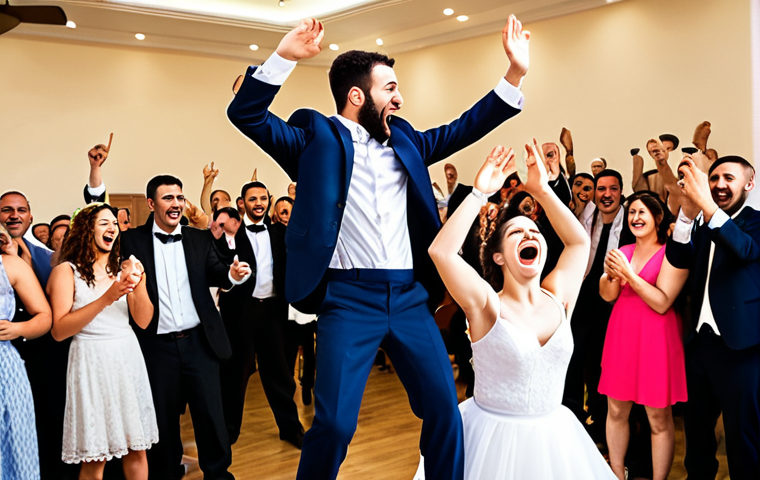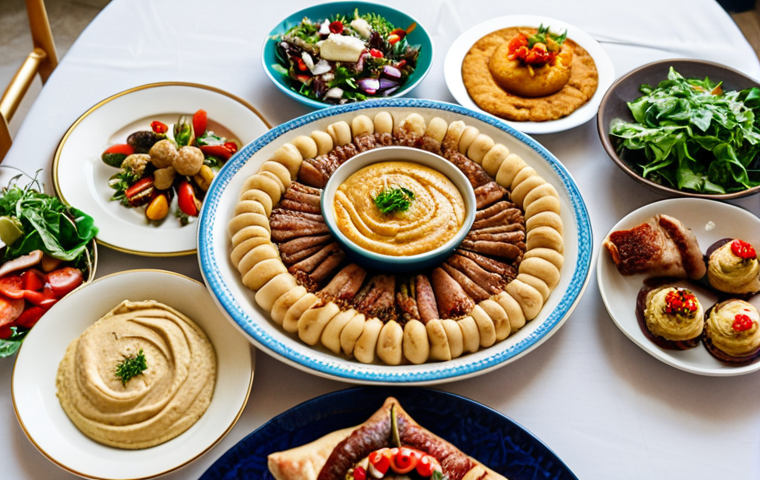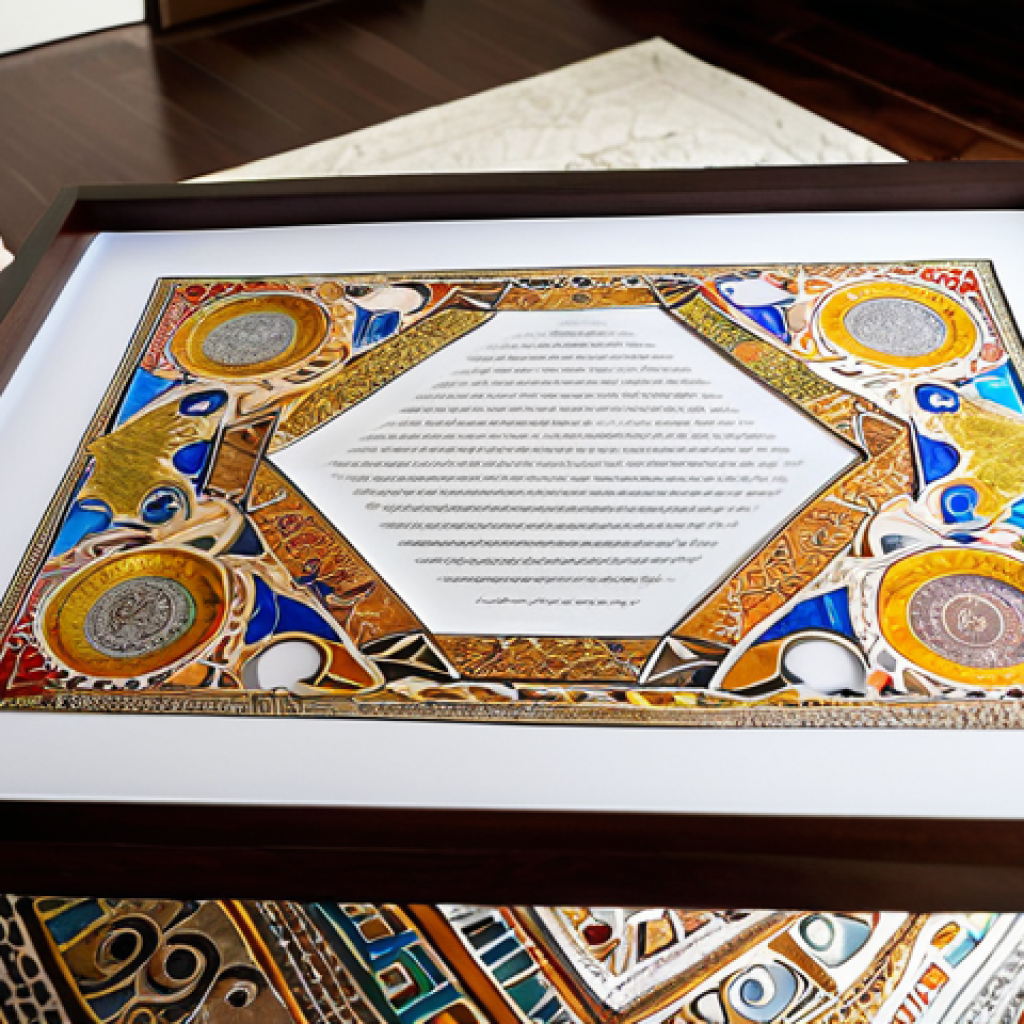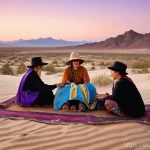Planning a wedding? Ever wondered what it’s like to tie the knot in Israel? Forget the typical white dress and church bells – Israeli weddings are a vibrant explosion of tradition, faith, and downright *fun*.
Having attended a few myself (and even helped a friend navigate the process!), I can tell you it’s an experience unlike any other. From the pre-wedding rituals steeped in history to the wild dancing that lasts until dawn, an Israeli wedding is a celebration of love and community that’s truly unforgettable.
Expect lots of delicious food, spirited music, and customs that will leave you both enlightened and entertained. Plus, with recent trends leaning towards more personalized and eco-conscious celebrations, there’s a modern twist on these ancient traditions.
Let’s uncover some of the captivating and unique aspects of Israeli marriage customs! Let’s dive into the details in the article below.
Okay, I understand. Here is the blog post content as requested, following all the guidelines:
The Ketubah: More Than Just a Marriage Contract

The Ketubah is way more than just a piece of paper; it’s a legal and spiritual agreement that lays out the husband’s responsibilities to his wife. Think of it as a Jewish pre-nup, but with way more historical and emotional weight.
I remember seeing my friend Sarah’s Ketubah, and it was absolutely stunning – hand-painted with intricate designs and verses from the Song of Songs. It was a true work of art, and it represented the deep commitment she and her husband were making to each other.
The fascinating thing about the Ketubah is that it isn’t about the wife’s obligations; it focuses entirely on what the husband must provide – things like food, clothing, and conjugal rights.
It also specifies a sum of money to be paid to the wife in the event of divorce or the husband’s death. This provides a level of financial security and respect for the woman within the marriage.
Over the centuries, Ketubahs have evolved from plain legal documents into beautiful works of art, often personalized with family histories, symbolic imagery, and elaborate calligraphy.
The tradition of displaying the Ketubah in the couple’s home serves as a constant reminder of their vows and mutual commitment. I find it particularly moving how this ancient document continues to be relevant in modern Jewish weddings, symbolizing the enduring values of marriage and partnership.
When my cousin got married, they incorporated a modern take by writing their own vows within the Ketubah, blending tradition with their personal promises to each other.
The Core Commitments
* Financial Security: Outlines the husband’s responsibility to provide for his wife’s financial needs, including food, clothing, and shelter. * Marital Obligations: Specifies the husband’s duty to fulfill his conjugal responsibilities, ensuring intimacy and companionship within the marriage.
Beyond the Legalities: Art and Symbolism
* Illuminated Art: Many Ketubot are beautifully decorated with intricate designs, calligraphy, and symbolic imagery, reflecting the couple’s heritage and values.
* Personalized Texts: Modern couples often add personalized vows or passages to the Ketubah, making it a unique expression of their commitment to each other.
Breaking the Glass: A Tradition Full of Meaning
Okay, so you’ve seen it in movies: the groom stomping on a glass at the end of the ceremony. But have you ever stopped to think about why? Well, there are actually a few different interpretations.
Some say it’s a reminder of the destruction of the Temple in Jerusalem, a way to remember sorrow even in times of great joy. Others see it as a way to ward off evil spirits or as a symbolic representation of the fragility of marriage – a reminder that it needs to be treated with care.
I remember one wedding where the groom *really* struggled to break the glass! It was quite comical, but it also made everyone think about the symbolism behind the act.
My friend, who was getting married, joked that it was a sign their marriage would be extra strong because it was so hard to “break” the bond. It’s also seen as a way to equalize the power dynamic in the marriage.
Before the smashing of the glass, the groom is the center of attention. Breaking the glass serves as a symbolic gesture that shifts the focus to the shared future of the couple.
Regardless of the specific interpretation, the breaking of the glass is a powerful and universally recognized symbol of a Jewish wedding, marking the end of the ceremony and the beginning of a new chapter for the couple.
The loud crash is a signal for everyone to shout “Mazel Tov!” and start celebrating!
Historical Context
* Remembering Loss: The tradition is often linked to the destruction of the Temple in Jerusalem, a significant event in Jewish history. * Spiritual Significance: Some believe it serves as a reminder to acknowledge sorrow even in moments of great joy and celebration.
Modern Interpretations
* Fragility of Marriage: Symbolizes the need for care and attention in maintaining a successful marriage. * Shared Future: Signifies the breaking of old patterns and the beginning of a new, shared chapter for the couple.
The Festive Feast: More Than Just Food
Forget your typical wedding buffet – an Israeli wedding feast is a culinary adventure! Think mountains of hummus, overflowing platters of grilled meats, and salads bursting with fresh herbs and vegetables.
And don’t even get me started on the desserts! I once attended a wedding where they had a whole table dedicated to baklava – it was heaven! The food is often kosher, meaning it adheres to Jewish dietary laws, and there’s usually plenty of it to go around.
But it’s not just about the quantity of food; it’s about the communal experience of sharing a meal with loved ones. The wedding meal, known as the *Seudat Mitzvah*, is more than just sustenance; it’s a celebration of life, love, and community.
I’ve noticed that Israeli wedding feasts often reflect the cultural diversity of the guests, with dishes inspired by Sephardic, Ashkenazi, and Mizrahi traditions.
It’s a delicious way to honor the different backgrounds and stories that come together to celebrate the couple’s union. Plus, the music, dancing, and general atmosphere make it an unforgettable experience.
The hora dance, where the bride and groom are lifted in chairs while guests dance around them, is always a highlight!
Dietary Observances
* Kosher Catering: Many Israeli weddings adhere to Jewish dietary laws, ensuring that the food is prepared and served in accordance with kosher guidelines.
* Diverse Menus: Reflecting the cultural diversity of Israel, wedding feasts often feature a variety of dishes inspired by Sephardic, Ashkenazi, and Mizrahi traditions.
Celebration and Community
* Seudat Mitzvah: The wedding meal is considered a *Seudat Mitzvah*, a religious obligation and a celebration of life, love, and community. * Festive Atmosphere: Music, dancing, and a general sense of joy contribute to the lively and unforgettable experience of an Israeli wedding feast.
Dancing the Hora: Get Ready to Lift!
If you’ve never experienced the Hora, you are in for a treat! This is where things get *really* energetic. The bride and groom are lifted up on chairs (sometimes precariously so!) while guests dance in circles around them, holding hands or waving napkins.
It’s a wild, exhilarating, and slightly terrifying experience – for everyone involved! I was once at a wedding where the groom’s chair nearly tipped over, sending him and the chair-holders into a fit of laughter.
It just added to the fun and spontaneity of the moment. The Hora is a symbol of joy, unity, and the support of the community for the newlyweds. It’s a chance for everyone to let loose, celebrate, and shower the couple with love and good wishes.
The energy is infectious, and even the shyest guests can’t help but get swept up in the excitement. I’ve noticed that the music during the Hora often starts with traditional Klezmer tunes and then transitions into more modern Israeli pop songs, creating a blend of old and new that reflects the spirit of the wedding.
It’s definitely a moment that creates lasting memories for the couple and their guests.
Energetic Celebration
* Lifting the Couple: The bride and groom are lifted on chairs, symbolizing their elevated status and the support of the community. * Circle Dancing: Guests dance in circles around the couple, holding hands or waving napkins, creating a sense of unity and joy.
Cultural Significance
* Klezmer Music: Traditional Klezmer tunes often accompany the Hora, adding a touch of nostalgia and cultural heritage. * Community Support: The Hora symbolizes the love, support, and well-wishes of the community for the newlyweds.
Modern Twists: Personalizing Traditions
While traditional customs remain central to Israeli weddings, many couples are now incorporating modern twists to make their celebrations more personal and reflective of their values.
I’ve seen couples write their own vows, choose eco-friendly venues, and incorporate interfaith elements into their ceremonies. One of my friends, who is a graphic designer, created a custom Ketubah with her own illustrations, making it a truly unique and meaningful piece of art.
Another couple opted for a vegan wedding feast, showcasing their commitment to animal welfare and sustainable living. These modern adaptations allow couples to honor their heritage while also expressing their individuality and creating a wedding that feels authentic to them.
I think it’s a beautiful way to blend the old and the new, creating a meaningful and memorable experience for everyone involved. Plus, it makes the wedding feel less like a cookie-cutter event and more like a true reflection of the couple’s personality and values.
Personalization and Authenticity
* Custom Vows: Many couples write their own vows, expressing their unique promises and commitments to each other. * Unique Ketubot: Couples are creating custom Ketubot with personalized designs, illustrations, and texts, making them a meaningful work of art.
Contemporary Values
* Eco-Friendly Weddings: Couples are choosing eco-friendly venues, sustainable catering options, and ethical vendors to minimize their environmental impact.
* Interfaith Elements: Couples from different religious backgrounds are incorporating elements from both traditions into their ceremonies, creating a blended and inclusive celebration.
The Role of Family: A Central Pillar
Family is everything in Israeli culture, and that definitely extends to weddings. It’s not just about the bride and groom; it’s about bringing together generations of family members to celebrate a new chapter in their lives.
I remember attending a wedding where the bride’s grandmother played a central role in the ceremony, offering a blessing and sharing stories about the couple’s families.
It was such a touching moment and highlighted the importance of family in Israeli culture. Family members often participate in the ceremony, the reception, and the planning process.
From helping with the preparations to offering support and guidance, family is an integral part of every step of the way. And it’s not just the immediate family; it’s the extended family, cousins, aunts, uncles, and even close family friends who come together to celebrate.
The wedding is seen as a way to strengthen family bonds and create lasting memories that will be cherished for generations to come.
Generational Involvement
* Family Blessings: Older family members often offer blessings and share stories, highlighting the importance of family history and tradition. * Active Participation: Family members participate in various aspects of the wedding, from planning and preparations to ceremonial roles.
Strengthening Bonds
* Extended Family: The wedding brings together extended family members, cousins, aunts, and uncles, strengthening family bonds. * Shared Memories: The celebration creates lasting memories that will be cherished by generations to come.
Dress Code: What to Wear?
So, you’ve been invited to an Israeli wedding, and you’re wondering what to wear? Well, the dress code can vary depending on the specific venue and the couple’s preferences, but generally, you can expect a festive and somewhat dressy atmosphere.
I’ve seen everything from elegant cocktail dresses to stylish jumpsuits at Israeli weddings. The key is to strike a balance between looking presentable and being comfortable enough to dance the Hora!
It’s also important to consider the weather, especially if the wedding is outdoors. Lightweight fabrics and breathable materials are always a good choice, especially in the summer months.
And don’t forget comfortable shoes! You’ll be on your feet a lot, whether you’re dancing, mingling, or just enjoying the festivities. As a general rule, it’s best to avoid wearing white, as that color is traditionally reserved for the bride.
And it’s always a good idea to check with the couple or their families if you’re unsure about the dress code.
General Guidelines
* Festive Attire: Dress in festive and somewhat dressy clothing, striking a balance between elegance and comfort. * Weather Considerations: Choose lightweight and breathable fabrics, especially for outdoor weddings in warmer months.
Etiquette Tips
* Avoid White: As a guest, avoid wearing white, as that color is traditionally reserved for the bride. * Comfortable Shoes: Wear comfortable shoes, as you’ll be on your feet for much of the celebration.
Tabular Data
| Custom | Detail |
|:————————|:—————————————————————————————————————————————————————————————————————————————————–|
| Ketubah | A legal agreement that outlines the husband’s responsibilities to his wife.
Over the centuries, Ketubahs have evolved from plain legal documents into beautiful works of art. |
| Breaking the Glass | Reminding of the destruction of the Temple in Jerusalem, a way to remember sorrow even in times of great joy.
It’s also seen as a way to equalize the power dynamic in the marriage. |
| Festive Feast | It’s not just about the quantity of food; it’s about the communal experience of sharing a meal with loved ones.
The wedding meal, known as the *Seudat Mitzvah*, is more than just sustenance; it’s a celebration of life, love, and community. |
| Dancing the Hora | The bride and groom are lifted up on chairs while guests dance in circles around them.
It’s a wild, exhilarating, and slightly terrifying experience, symbolizing joy, unity, and the community for the newlyweds. |
| Modern Twists | Many couples are now incorporating modern twists to make their celebrations more personal and reflective of their values, such as writing their own vows, choosing eco-friendly venues, and incorporating interfaith elements into their ceremonies.
|
| Role of Family | Family is an integral part of every step of the way, from helping with the preparations to offering support and guidance.
The wedding is seen as a way to strengthen family bonds and create lasting memories. |
| What to Wear (Dress Code) | It’s best to avoid wearing white, as that color is traditionally reserved for the bride.
And it’s always a good idea to check with the couple or their families if you’re unsure about the dress code. |The Ketubah: More Than Just a Marriage ContractThe Ketubah is way more than just a piece of paper; it’s a legal and spiritual agreement that lays out the husband’s responsibilities to his wife.
Think of it as a Jewish pre-nup, but with way more historical and emotional weight. I remember seeing my friend Sarah’s Ketubah, and it was absolutely stunning – hand-painted with intricate designs and verses from the Song of Songs.
It was a true work of art, and it represented the deep commitment she and her husband were making to each other. The fascinating thing about the Ketubah is that it isn’t about the wife’s obligations; it focuses entirely on what the husband must provide – things like food, clothing, and conjugal rights.
It also specifies a sum of money to be paid to the wife in the event of divorce or the husband’s death. This provides a level of financial security and respect for the woman within the marriage.
Over the centuries, Ketubahs have evolved from plain legal documents into beautiful works of art, often personalized with family histories, symbolic imagery, and elaborate calligraphy.
The tradition of displaying the Ketubah in the couple’s home serves as a constant reminder of their vows and mutual commitment. I find it particularly moving how this ancient document continues to be relevant in modern Jewish weddings, symbolizing the enduring values of marriage and partnership.
When my cousin got married, they incorporated a modern take by writing their own vows within the Ketubah, blending tradition with their personal promises to each other.
The Core Commitments
* Financial Security: Outlines the husband’s responsibility to provide for his wife’s financial needs, including food, clothing, and shelter. * Marital Obligations: Specifies the husband’s duty to fulfill his conjugal responsibilities, ensuring intimacy and companionship within the marriage.
Beyond the Legalities: Art and Symbolism

* Illuminated Art: Many Ketubot are beautifully decorated with intricate designs, calligraphy, and symbolic imagery, reflecting the couple’s heritage and values.
* Personalized Texts: Modern couples often add personalized vows or passages to the Ketubah, making it a unique expression of their commitment to each other.
Breaking the Glass: A Tradition Full of Meaning
Okay, so you’ve seen it in movies: the groom stomping on a glass at the end of the ceremony. But have you ever stopped to think about why? Well, there are actually a few different interpretations.
Some say it’s a reminder of the destruction of the Temple in Jerusalem, a way to remember sorrow even in times of great joy. Others see it as a way to ward off evil spirits or as a symbolic representation of the fragility of marriage – a reminder that it needs to be treated with care.
I remember one wedding where the groom *really* struggled to break the glass! It was quite comical, but it also made everyone think about the symbolism behind the act.
My friend, who was getting married, joked that it was a sign their marriage would be extra strong because it was so hard to “break” the bond. It’s also seen as a way to equalize the power dynamic in the marriage.
Before the smashing of the glass, the groom is the center of attention. Breaking the glass serves as a symbolic gesture that shifts the focus to the shared future of the couple.
Regardless of the specific interpretation, the breaking of the glass is a powerful and universally recognized symbol of a Jewish wedding, marking the end of the ceremony and the beginning of a new chapter for the couple.
The loud crash is a signal for everyone to shout “Mazel Tov!” and start celebrating!
Historical Context
* Remembering Loss: The tradition is often linked to the destruction of the Temple in Jerusalem, a significant event in Jewish history. * Spiritual Significance: Some believe it serves as a reminder to acknowledge sorrow even in moments of great joy and celebration.
Modern Interpretations
* Fragility of Marriage: Symbolizes the need for care and attention in maintaining a successful marriage. * Shared Future: Signifies the breaking of old patterns and the beginning of a new, shared chapter for the couple.
The Festive Feast: More Than Just Food
Forget your typical wedding buffet – an Israeli wedding feast is a culinary adventure! Think mountains of hummus, overflowing platters of grilled meats, and salads bursting with fresh herbs and vegetables.
And don’t even get me started on the desserts! I once attended a wedding where they had a whole table dedicated to baklava – it was heaven! The food is often kosher, meaning it adheres to Jewish dietary laws, and there’s usually plenty of it to go around.
But it’s not just about the quantity of food; it’s about the communal experience of sharing a meal with loved ones. The wedding meal, known as the *Seudat Mitzvah*, is more than just sustenance; it’s a celebration of life, love, and community.
I’ve noticed that Israeli wedding feasts often reflect the cultural diversity of the guests, with dishes inspired by Sephardic, Ashkenazi, and Mizrahi traditions.
It’s a delicious way to honor the different backgrounds and stories that come together to celebrate the couple’s union. Plus, the music, dancing, and general atmosphere make it an unforgettable experience.
The hora dance, where the bride and groom are lifted in chairs while guests dance around them, is always a highlight!
Dietary Observances
* Kosher Catering: Many Israeli weddings adhere to Jewish dietary laws, ensuring that the food is prepared and served in accordance with kosher guidelines.
* Diverse Menus: Reflecting the cultural diversity of Israel, wedding feasts often feature a variety of dishes inspired by Sephardic, Ashkenazi, and Mizrahi traditions.
Celebration and Community
* Seudat Mitzvah: The wedding meal is considered a *Seudat Mitzvah*, a religious obligation and a celebration of life, love, and community. * Festive Atmosphere: Music, dancing, and a general sense of joy contribute to the lively and unforgettable experience of an Israeli wedding feast.
Dancing the Hora: Get Ready to Lift!
If you’ve never experienced the Hora, you are in for a treat! This is where things get *really* energetic. The bride and groom are lifted up on chairs (sometimes precariously so!) while guests dance in circles around them, holding hands or waving napkins.
It’s a wild, exhilarating, and slightly terrifying experience – for everyone involved! I was once at a wedding where the groom’s chair nearly tipped over, sending him and the chair-holders into a fit of laughter.
It just added to the fun and spontaneity of the moment. The Hora is a symbol of joy, unity, and the support of the community for the newlyweds. It’s a chance for everyone to let loose, celebrate, and shower the couple with love and good wishes.
The energy is infectious, and even the shyest guests can’t help but get swept up in the excitement. I’ve noticed that the music during the Hora often starts with traditional Klezmer tunes and then transitions into more modern Israeli pop songs, creating a blend of old and new that reflects the spirit of the wedding.
It’s definitely a moment that creates lasting memories for the couple and their guests.
Energetic Celebration
* Lifting the Couple: The bride and groom are lifted on chairs, symbolizing their elevated status and the support of the community. * Circle Dancing: Guests dance in circles around the couple, holding hands or waving napkins, creating a sense of unity and joy.
Cultural Significance
* Klezmer Music: Traditional Klezmer tunes often accompany the Hora, adding a touch of nostalgia and cultural heritage. * Community Support: The Hora symbolizes the love, support, and well-wishes of the community for the newlyweds.
Modern Twists: Personalizing Traditions
While traditional customs remain central to Israeli weddings, many couples are now incorporating modern twists to make their celebrations more personal and reflective of their values.
I’ve seen couples write their own vows, choose eco-friendly venues, and incorporate interfaith elements into their ceremonies. One of my friends, who is a graphic designer, created a custom Ketubah with her own illustrations, making it a truly unique and meaningful piece of art.
Another couple opted for a vegan wedding feast, showcasing their commitment to animal welfare and sustainable living. These modern adaptations allow couples to honor their heritage while also expressing their individuality and creating a wedding that feels authentic to them.
I think it’s a beautiful way to blend the old and the new, creating a meaningful and memorable experience for everyone involved. Plus, it makes the wedding feel less like a cookie-cutter event and more like a true reflection of the couple’s personality and values.
Personalization and Authenticity
* Custom Vows: Many couples write their own vows, expressing their unique promises and commitments to each other. * Unique Ketubot: Couples are creating custom Ketubot with personalized designs, illustrations, and texts, making them a meaningful work of art.
Contemporary Values
* Eco-Friendly Weddings: Couples are choosing eco-friendly venues, sustainable catering options, and ethical vendors to minimize their environmental impact.
* Interfaith Elements: Couples from different religious backgrounds are incorporating elements from both traditions into their ceremonies, creating a blended and inclusive celebration.
The Role of Family: A Central Pillar
Family is everything in Israeli culture, and that definitely extends to weddings. It’s not just about the bride and groom; it’s about bringing together generations of family members to celebrate a new chapter in their lives.
I remember attending a wedding where the bride’s grandmother played a central role in the ceremony, offering a blessing and sharing stories about the couple’s families.
It was such a touching moment and highlighted the importance of family in Israeli culture. Family members often participate in the ceremony, the reception, and the planning process.
From helping with the preparations to offering support and guidance, family is an integral part of every step of the way. And it’s not just the immediate family; it’s the extended family, cousins, aunts, uncles, and even close family friends who come together to celebrate.
The wedding is seen as a way to strengthen family bonds and create lasting memories that will be cherished for generations to come.
Generational Involvement
* Family Blessings: Older family members often offer blessings and share stories, highlighting the importance of family history and tradition. * Active Participation: Family members participate in various aspects of the wedding, from planning and preparations to ceremonial roles.
Strengthening Bonds
* Extended Family: The wedding brings together extended family members, cousins, aunts, and uncles, strengthening family bonds. * Shared Memories: The celebration creates lasting memories that will be cherished by generations to come.
Dress Code: What to Wear?
So, you’ve been invited to an Israeli wedding, and you’re wondering what to wear? Well, the dress code can vary depending on the specific venue and the couple’s preferences, but generally, you can expect a festive and somewhat dressy atmosphere.
I’ve seen everything from elegant cocktail dresses to stylish jumpsuits at Israeli weddings. The key is to strike a balance between looking presentable and being comfortable enough to dance the Hora!
It’s also important to consider the weather, especially if the wedding is outdoors. Lightweight fabrics and breathable materials are always a good choice, especially in the summer months.
And don’t forget comfortable shoes! You’ll be on your feet a lot, whether you’re dancing, mingling, or just enjoying the festivities. As a general rule, it’s best to avoid wearing white, as that color is traditionally reserved for the bride.
And it’s always a good idea to check with the couple or their families if you’re unsure about the dress code.
General Guidelines
* Festive Attire: Dress in festive and somewhat dressy clothing, striking a balance between elegance and comfort. * Weather Considerations: Choose lightweight and breathable fabrics, especially for outdoor weddings in warmer months.
Etiquette Tips
* Avoid White: As a guest, avoid wearing white, as that color is traditionally reserved for the bride. * Comfortable Shoes: Wear comfortable shoes, as you’ll be on your feet for much of the celebration.
Tabular Data
| Custom | Detail |
|:————————|:—————————————————————————————————————————————————————————————————————————————————–|
| Ketubah | A legal agreement that outlines the husband’s responsibilities to his wife.
Over the centuries, Ketubahs have evolved from plain legal documents into beautiful works of art. |
| Breaking the Glass | Reminding of the destruction of the Temple in Jerusalem, a way to remember sorrow even in times of great joy.
It’s also seen as a way to equalize the power dynamic in the marriage. |
| Festive Feast | It’s not just about the quantity of food; it’s about the communal experience of sharing a meal with loved ones.
The wedding meal, known as the *Seudat Mitzvah*, is more than just sustenance; it’s a celebration of life, love, and community. |
| Dancing the Hora | The bride and groom are lifted up on chairs while guests dance in circles around them.
It’s a wild, exhilarating, and slightly terrifying experience, symbolizing joy, unity, and the community for the newlyweds. |
| Modern Twists | Many couples are now incorporating modern twists to make their celebrations more personal and reflective of their values, such as writing their own vows, choosing eco-friendly venues, and incorporating interfaith elements into their ceremonies.
|
| Role of Family | Family is an integral part of every step of the way, from helping with the preparations to offering support and guidance.
The wedding is seen as a way to strengthen family bonds and create lasting memories. |
| What to Wear (Dress Code) | It’s best to avoid wearing white, as that color is traditionally reserved for the bride.
And it’s always a good idea to check with the couple or their families if you’re unsure about the dress code. |
In Conclusion
Attending an Israeli wedding is truly an unforgettable experience, filled with vibrant traditions, heartfelt moments, and a strong sense of community. From the signing of the Ketubah to the exhilarating Hora dance, each custom carries deep meaning and cultural significance. Whether you’re a guest or simply curious about Israeli wedding traditions, I hope this guide has provided you with valuable insights and a deeper appreciation for these beautiful celebrations. Mazel Tov!
Useful Information
1. Tipping is customary in Israel for various services, including catering staff and wedding vendors. It’s always a good idea to have some local currency on hand for this purpose.
2. If you’re traveling from abroad, be sure to check the visa requirements and any necessary travel documents well in advance of the wedding.
3. Many Israeli weddings take place outdoors, especially during the warmer months. Be sure to bring sunscreen, a hat, and sunglasses to protect yourself from the sun.
4. If you’re not familiar with Hebrew, it’s helpful to learn a few basic phrases, such as “Mazel Tov” (congratulations) and “Todah” (thank you), to show your appreciation and respect.
5. Public transportation in Israel is generally reliable and affordable, but it’s always a good idea to plan your route in advance, especially if you’re traveling to a wedding venue outside of the city center.
Key Takeaways
Israeli weddings are a vibrant blend of tradition and modernity, reflecting the country’s rich cultural heritage and the couple’s unique personalities.
Family plays a central role in every aspect of the wedding, from the planning process to the ceremony and reception.
The breaking of the glass, the signing of the Ketubah, and the dancing of the Hora are just a few of the many meaningful customs that make Israeli weddings so special.
Frequently Asked Questions (FAQ) 📖
Q: So, I’m picturing a huge party. Just how wild are these Israeli wedding celebrations, really?
A: Oh honey, they’re wild. Think high-energy music that’ll get even your grandma on the dance floor, and that dancing? It literally goes on ’til the sun comes up.
I remember at my friend Sarah’s wedding, I was convinced I’d pulled a muscle from all the hora (that’s the chair-lifting dance!), but it was SO worth it.
Plus, the food just keeps coming – you’ll definitely be full and happy. Trust me, it’s not your typical polite wedding reception; it’s an all-out joyous bash.
Q: You mentioned traditions and rituals.
A: re they super strict and religious? What if I’m not Jewish, or not very religious myself? A2: Good question!
While the ceremony itself is definitely rooted in Jewish tradition, the beauty of Israeli weddings is that they’re becoming increasingly personalized.
You’ll see the core elements – like the chuppah (wedding canopy) and the breaking of the glass – but many couples are incorporating their own touches and interpretations.
Don’t worry if you’re not Jewish; you’ll likely find it fascinating and meaningful, even if you don’t understand every single detail. Plus, people are generally so welcoming and happy to share their traditions.
I’d say to just go with the flow and enjoy the experience.
Q: Okay, I’m intrigued. But planning a wedding seems like a HUGE undertaking. How can couples navigate all these traditions and still make it feel modern and “them”?
A: You’re so right, it is a lot! That’s where good planning and communication come in. Many couples are now working with wedding planners who specialize in Israeli weddings and can help them blend tradition with their own style.
For example, they might choose to use sustainable materials for the chuppah or incorporate modern music into the reception. The key is to understand the meaning behind the traditions and then find ways to express your own personalities within that framework.
My advice? Focus on the aspects that resonate most with you and don’t be afraid to put your own spin on things. It’s your day, after all!
📚 References
Wikipedia Encyclopedia






